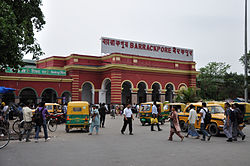Barrackpur
|
Barrackpore ব্যারাকপুর बैरकपुर |
|
|---|---|
| Neighborhood in Kolkata [Subdivision] | |

Barrackpore Railway Station
|
|
| Location in West Bengal, India | |
| Coordinates: 22°46′N 88°22′E / 22.76°N 88.37°ECoordinates: 22°46′N 88°22′E / 22.76°N 88.37°E | |
| Country |
|
| State | West Bengal |
| District | kolkata |
| City | Kolkata |
| Government | |
| • Municipality Chairman | Uttam Das |
| Area | |
| • Total | 25 km2 (10 sq mi) |
| Elevation | 15 m (49 ft) |
| Population (2011) | |
| • Total | 154,475 |
| • Density | 6,200/km2 (16,000/sq mi) |
| Languages | |
| • Official | Bengali, English |
| Time zone | IST (UTC+5:30) |
| PIN | 700120,700121,700122 |
| Telephone code | 9133 |
| Lok Sabha constituency | Barrackpore |
| Vidhan Sabha constituency | Barrackpore, Naihati, Jagatdal, Noapara, Khardaha |
| Website | www |
Barrackpore, or Barrackpur, is the headquarters of the Barrackpore subdivision in the North 24 Parganas district, and is situated in North Kolkata. Barrackpore is a part of the area covered by the Kolkata Metropolitan Development Authority in the Indian state of West Bengal. Historically, the town was a military and administrative center under British rule, and was the scene of several acts of rebellion against Britain during the 19th century. The oldest cantonment in India and the Police Training Academy in West Bengal are both located in Barrackpore. Barrackpore is also the seat for the Sub-Divisional Court of Northern 24 Parganas District. The Barrackpore Police Commissionerate is responsible for law enforcement in the city.
The name Barrackpore may have originated from the English word barracks, as it was the site of the first cantonment of the British East India Company. Alternatively, the Ain-i-Akbari suggests that the name comes from "Barbakpur".Manasa Vijay, written by Bipradas Pipilai, refers to Barrackpore as "Chanak".
The earliest references to the Barrackpore region are found in the writings of the Greek navigators, geographers, chronicles and historians of the 1st century BC to the 3rd century AD. These authors generally referred to the country of a people variously called the Gangaridae, Gangaridai, Gandaritai etc. By the 15th and 16th centuries, Chanak and the other towns in the region had become populous river towns. The Statistical Account of Bengal by W.W.Hunter mentions the towns and villages of this subdivision on the banks of the Hooghly river as chief trading and marketing centres: "On The Hugli- Calcutta, the chief seat of commerce in India. Baranagar, Dakhineswar, Agarpara, Panihati, Sukchar- Khardah, Barrackpur, Nawabganj, Ichapore, Shyam Nagar, Naihati and Halisahar contain large bazaars for sale of miscellaneous goods."
...
Wikipedia

